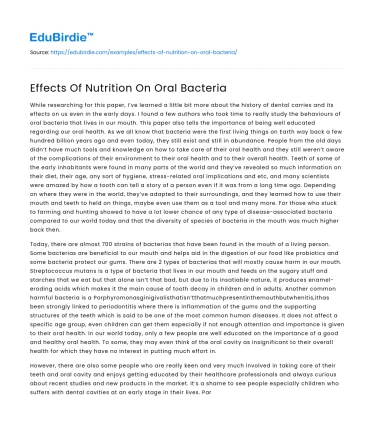Introduction
The intricate relationship between nutrition and oral health has been a subject of increasing interest in recent years. Oral bacteria, which are a natural component of the human microbiome, play a crucial role in maintaining oral health, but their balance can be disrupted by various dietary factors. Nutrition not only provides sustenance to the human body but also influences the microbial ecosystems within, particularly in the oral cavity. As the first point of contact for ingested food, the mouth hosts a diverse array of bacteria whose growth and activity are directly affected by nutrients. Understanding how different types of foods impact these oral bacteria is essential for developing effective dietary guidelines to promote oral health and prevent diseases such as dental caries and periodontal disease. This essay will explore the effects of nutrition on oral bacteria, examining both beneficial and detrimental dietary components, and consider counter-arguments to provide a comprehensive view of the topic.
Carbohydrates and Oral Bacteria
Carbohydrates, particularly fermentable sugars, have a well-documented impact on the proliferation of oral bacteria. These sugars serve as a primary energy source for bacteria like Streptococcus mutans, a major contributor to dental caries. The frequent consumption of sugary foods and beverages leads to an increase in acid production by these bacteria, resulting in the demineralization of tooth enamel. According to a study by Sheiham and James (2015), there is a positive correlation between sugar intake and the prevalence of dental caries across different populations. This underscores the need for reducing sugar consumption as a preventive strategy against oral diseases.
Save your time!
We can take care of your essay
- Proper editing and formatting
- Free revision, title page, and bibliography
- Flexible prices and money-back guarantee
However, carbohydrates are not universally detrimental to oral health. Complex carbohydrates, such as those found in whole grains, have less pronounced effects on oral bacteria. These carbohydrates require more mechanical breakdown, stimulating saliva production which helps neutralize acids and wash away food particles. Moreover, whole grains often contain phytochemicals that may contribute to inhibiting bacterial growth. Thus, while reducing sugar intake is crucial, it is equally important to distinguish between different types of carbohydrates and their respective impacts on oral microbiota.
Proteins and Fats: Their Role in Oral Health
Proteins and fats, though less directly implicated in dental caries than carbohydrates, still influence the oral bacterial landscape. Proteins, when broken down, produce ammonia, which can neutralize acids in the mouth, thereby reducing the risk of enamel erosion. Furthermore, certain amino acids found in proteins can have antimicrobial properties. For instance, a study by Bradshaw et al. (1994) demonstrated that arginine, an amino acid present in various foods, can inhibit the growth of cariogenic bacteria.
Fats, on the other hand, have been observed to form a protective coating on tooth surfaces, potentially reducing bacterial adhesion. Additionally, some fatty acids possess antibacterial properties. Lauric acid, prevalent in coconut oil, has been shown to disrupt the cell membranes of harmful bacteria, thereby reducing their population. Despite these benefits, excessive intake of fats, particularly saturated fats, is associated with systemic health issues that can indirectly affect oral health. Therefore, while proteins and fats can support oral health, they must be consumed in moderation within a balanced diet.
Counterarguments and Comprehensive Dietary Approaches
Some argue that the focus on individual nutrients oversimplifies the complex interactions within the diet and oral microbiota. For instance, the protective effects of dairy products, which are rich in calcium and phosphates, suggest that a holistic dietary approach might be more beneficial. A study by Moynihan and Kelly (2014) highlights that cheese consumption increases saliva flow and elevates plaque calcium concentration, thereby enhancing enamel remineralization. This suggests that dietary patterns rather than isolated nutrients should be emphasized in oral health strategies.
Additionally, the role of probiotics in oral health presents a promising avenue for research. Probiotic-rich foods, like yogurt, can introduce beneficial bacteria that compete with pathogenic species, potentially reducing the incidence of oral diseases. However, more research is needed to establish the efficacy and optimal strains of probiotics for oral health. Nevertheless, these perspectives underscore the importance of a holistic dietary approach that considers the synergistic effects of various nutrients on oral bacteria.
Conclusion
Nutrition plays a pivotal role in shaping the oral microbiota, influencing both the composition and activity of bacterial communities in the mouth. While carbohydrates, particularly sugars, are well-recognized for their detrimental effects, proteins and fats can offer protective benefits under certain conditions. Moreover, a comprehensive dietary approach that considers the synergistic effects of various nutrients, including the potential benefits of probiotics, may offer a more effective strategy for maintaining oral health. As dietary habits continue to evolve with lifestyle changes, ongoing research is essential to fully understand the complex interplay between nutrition and oral bacteria, ultimately guiding public health recommendations and individual dietary choices towards improved oral health outcomes.






 Stuck on your essay?
Stuck on your essay?

